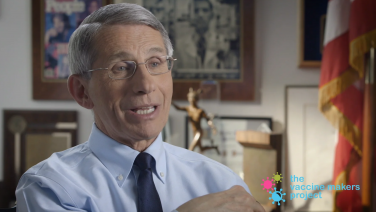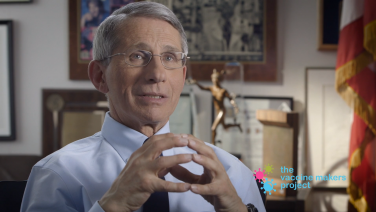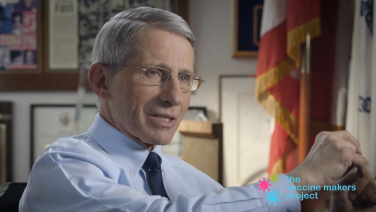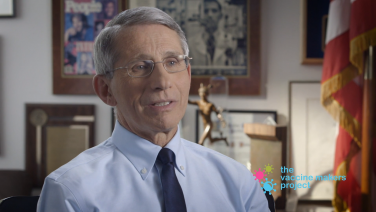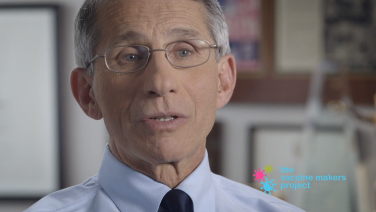Anthony Fauci:
Leading the fight against infectious diseases for nearly four decades
As the COVID-19 pandemic evolved in 2020, Dr. Anthony “Tony” Fauci became a familiar face and voice of reason as part of the White House Coronavirus Task Force. While Dr. Fauci was previously unknown to many Americans, he has been an integral part of public health and infectious disease responses for several decades.
Early Life
Anthony Fauci was born in Brooklyn, New York in 1940 to first generation Italian American parents. His mother and father married shortly after high school, while both were in college. His father became a pharmacist and eventually owned his own drugstore. From a young age, Tony would help his father by delivering items from the drugstore throughout the neighborhood. While in high school and college, he was drawn to the problem-solving aspect of science, but also had an inherent interest in people — how they interacted, the history of people and civilizations, and the humanities. He decided to pursue a career in medicine as a way of joining these interests.
Education and Training
Fauci attended the College of the Holy Cross in Worcester, Massachusetts from 1958 to 1962, where he studied a hybrid of classics and science. After college, he attended Cornell Medical School. He wanted to be a practicing physician, seeing patients and teaching. While he did not set out with the goal of becoming a physician scientist—one who sees patients and does scientific research—that is what eventually happened.
Because the United States was involved in the Vietnam War when Fauci graduated from medical school, he, like all new (male) physicians, was required to serve the nation in one of the branches of the armed forces or in the Public Health Service (PHS) at the National Institutes of Health (NIH). By this time his interest in science and people had led Dr. Fauci toward the study of infectious diseases and immunology, so his first choice for placement was the PHS. He was accepted to a fellowship at the NIH to study immunology in the lab of Dr. Sheldon Wolff. Although Dr. Fauci had no experience in a scientific laboratory, his introduction to “bench work,” meaning lab-based research, was successful and ultimately led to a research position at the NIH.
Career
From 1972 to 1981, Dr. Fauci’s lab at the NIH focused on regulation of the human immune system. Much of the work carried out in his lab was focused on diseases caused by the immune system, not on diseases caused by infectious agents, such as viruses or bacteria. Indeed, Dr. Fauci was the first to find what was essentially a cure for a rare immunological disease, called Wegener’s Granulomatosis. But, the course of his career changed in the early 1980s, when details began to emerge about young gay men becoming ill with diseases typically seen in immunosuppressed patients.
Based on his experience with diseases that affect the immune system, Fauci suspected that this new condition was being caused by a virus, and given that it was initially occurring only in gay men, he suspected it was sexually transmitted. As Dr. Fauci had a background in infectious diseases and experience with immunosuppressed patients, he decided to shift his research focus and started studying what ended up being acquired immune deficiency syndrome or AIDS, which was later discovered to be caused by human immunodeficiency virus (HIV). Dr. Fauci’s lab made significant contributions to the understanding of how AIDS destroys the immune system, leading to infections caused by microbes that do not typically cause disease. During this time, Dr. Fauci also became a public spokesperson about HIV and AIDS. His role as a spokesperson would only grow over time.
In 1984, Dr. Fauci became the director of the National Institute of Allergy and Infectious Diseases (NIAID). He agreed to take the position only if he could continue seeing patients and keep his research lab. No other NIAID director had ever maintained these roles while overseeing NIAID. As director, Dr. Fauci continued to rewrite the rules. During the late 1980’s, he invited HIV/AIDS activists to meet with him and discuss issues surrounding AIDS. These discussions were the beginning of communication between activists and the scientists studying their cause. Dr. Fauci continued to be a voice for HIV/AIDS and advocating for resources to advance the understanding, prevention and treatment of AIDS.
Dr. Fauci served as NIAID director during seven presidencies, including Ronald Reagan, George H. W. Bush, Bill Clinton, George W. Bush, Barrack Obama, Donald Trump and Joe Biden. He has testified before the U.S. Congress about every major public health crisis since 1984, including HIV/AIDS, Ebola, anthrax, and COVID-19. Even though his role as NIAID director was itself a full-time position, Dr. Fauci continued to care for patients and oversee a large research program. In 2019, Dr. Fauci was the 41st most cited research scientist in history. The number of times his work has been cited by other researchers between 1980 and the start of 2019 ranked him 8th on the list of most cited scientists in the field of immunology. He has received numerous awards, including the Presidential Medal of Freedom, and has been the recipient of more than 45 honorary doctoral degrees. In a 2015 interview, he described himself as a workaholic, indicating that he generally worked about 16 to 17 hours per day and on weekends (AAI, 2015).
Dr. Fauci officially retired from his positions of NIAID Director, Chief of the NIAID Laboratory of Immunoregulation, and Chief Medical Advisor to the President at the end of 2022. In a statement on the NIAID website, Dr. Fauci wrote, "While I am moving on from my current positions, I am not retiring...I want to use what I have learned as NIAID Director to continue to advance science and public health and to inspire and mentor the next generation of scientific leaders as they help prepare the world to face future infectious disease threats."
Dr. Fauci has been married for more than 35 years. His wife, Dr. Christine Grady, has a doctorate in nursing and also worked at the NIH for several decades, serving as the chief of the Department of Bioethics at the NIH Clinical Center. The couple has three grown daughters. In his “free time,” Dr. Fauci enjoys running and going out to dinner with his wife, who he describes as his best friend (AAI, 2015).
Watch these video clips from an interview with Dr. Fauci during the making of HILLEMAN – A Perilous Quest to Save the World’s Children:
Resources for further reading
- The American Association of Immunologists Oral History Project (AAI) – 2015 interview
- National Institute of Allergy and Infectious Diseases biography
- National Institute of Allergy and Infectious Diseases – Statement by Anthony S. Fauci, M.D.
- “Anthony Fauci: A Mosquito in My Backyard Made Me the Sickest I’ve Ever Been,” guest essay, New York Times (10/7/24)
Banner image credit: National Institutes of Health

